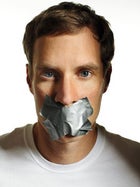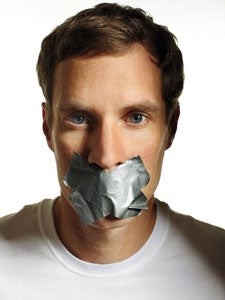Hypothesis: Being radically honest will improve mental and physical health
ADVENTURES IN TRUTH
Five Blanton honesty tipsKEEP TRACK: Note how often you bite your tongue, sugarcoat a reply, or flat-out tell a lie, white or otherwise. You’ll realize, Blanton says, “how much of your life is like a superficial sitcom.”MAKE A PACT: Tell the truth with just one person, like your spouse, as opposed to going all in with everybody.
“STAY WITH PEOPLE”: Your honesty will offend some. “Stick with them,” says Blanton, “You’ll be surprised how quickly people can move on.”
ADDRESS PROBLEMS IN REAL TIME: It’s sometimes easier to forgive lies that are several days (or years) old, but doing so, says Blanton, creates unintimate relationships.
SKIP BLANTON’S KOOKIEST BITS: …
Lie
 In one study, 60 percent of the participants lied two to three times during a ten-minute conversation.
In one study, 60 percent of the participants lied two to three times during a ten-minute conversation.Time Commitment: 30 Days
Researcher: Sam Moulton
When I inform my wife, Nicole, that I’m going to tell the truth for 30 days, she’s quick to reply. “How’s that going to be different than you normally are?” While I’m often candid with Nicole, I hit the people-pleasing trifecta: I’m a Cancer, a middle child, and a Midwesterner. I hate conflict. In other words, I lie more than most. (And most people lie all the time: in one study, 60 percent of the participants lied two to three times during a ten-minute conversation.) But I had no idea how often I lied until I read Radical Honesty.
Brad Blanton, a Virginia-based psychotherapist and the author and founder of the Radical Honesty movement, espouses a simple idea: we’d all be happier if we told the truth. About everything, from serious emotional issues, like whether you’ve been faithful to your spouse, to more mundane matters, like whether you like your co-worker’s new haircut. Although there are no conclusive scientific studies to back it up, Blanton believes that lying is the primary cause of most psychological and physical illness, including anxiety, depression, ulcers, insomnia, skin rashes, and high blood pressure. He doesn’t recommend you tell the truth 100 percent of the time (“especially when talking to a cop or a lawyer”), but he firmly believes that, in the long run, we’d all be better off, both personally and as a society, if we cut the superficial bullshit and spoke our minds.
At first, I’m fired up to circumvent my filter. I write RADICAL in big block letters on one sticky note, HONESTY on another, and stick ’em both on my computer. I pull my notes out from the book: “Be descriptive and precise.” Use phrases like “I resent you for …” or “I appreciate you for …” A few days later, a writer sends me a disingenuous e-mail. I look at the stickies and start hammering out a hot one. But then I begin thinking about the consequences. We’re old friends. He might be an editor at a magazine in the future; I might need work. I delete the e-mail.
When I tell the editor of this story about my lack of courage, she calls me a wimp. I expect the same from Blanton, but he’s surprisingly gentle. “Talking in person is always preferable,” he says. “You should have kept the e-mail, taken it with you next time you were going to see him, and let him read it while you’re sitting there.”
I do have some successes, though. During a face-to-face meeting, a co-worker asks for some feedback. I swallow hard and tell him what I think his strengths and weaknesses are. He’s not pissed with my frank assessment; he appreciates my honesty. We proceed to have a really open and productive conversation about work. Emboldened, I proceed to burst the bubble of an earnest ski mountaineer who tries to sell me on her upcoming expedition. I tell her exactly why her pitch is lame, but then “stick with her,” as Blanton says, and give her some specific ideas about how to make it better. Ultimately she thanks me for being so candid. It feels good.
A few nights later, Nicole asks for some feedback on a photography assignment she’s been working on all evening. It’s late. I’m getting ready for bed. I know what I should do. While she does value and want my honest feedback, she doesn’t want it right now. Now she needs some kind words and support.
But I’ve been thinking about radical honesty, how I need to stop being so spineless. So I let her have it. “I’m just being honest,” I stammer, reminding her about my project. Sensing that it’s going badly, I tell her I’m tired and I want to go to bed. This is also the truth, and also unwise. She starts crying. I feel like a jerk. A few minutes later, I apologize and officially make up my mind: sometimes telling the truth is a terrible idea.


